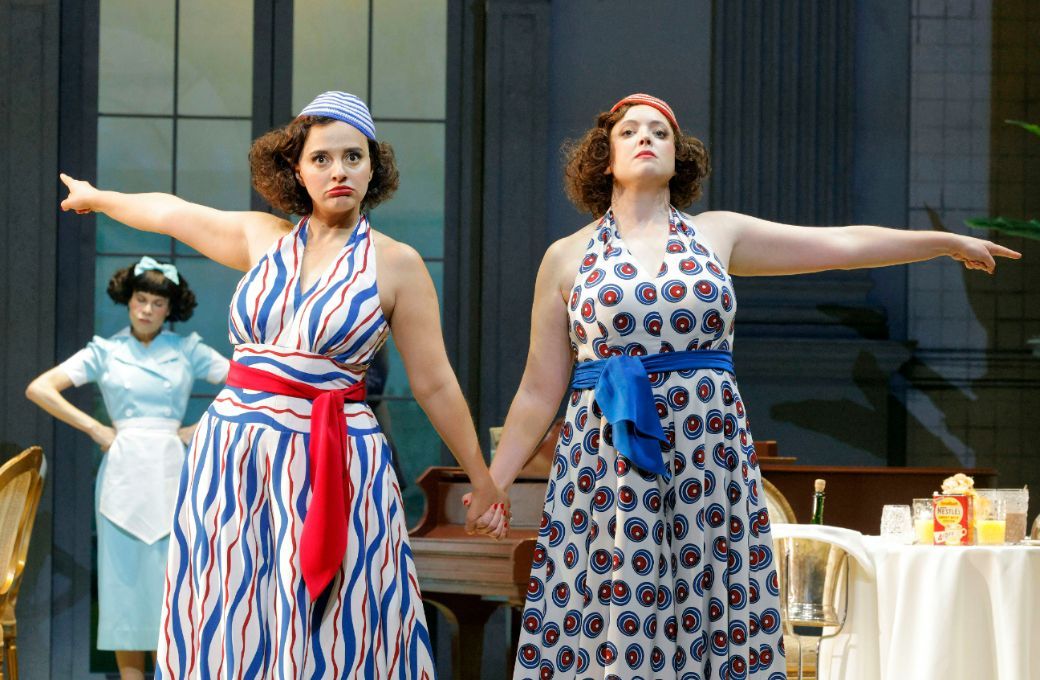Wolfgang Amadeus Mozart's Così fan tutte receives a Jazz Age makeover in a new-to-LA staging of the perennial comedy classic. The setting evokes Jay Gatsby's East Egg mansion, but the energy and sophistication was more Bringing Up Baby with some sexy Busby Berkeley choreography. Perhaps without meaning to, Michael Cavanagh's sleek production, designed by Erhard Rom and conducted by James Conlon, transforms the 18th-century opera into a Broadway musical, score by Mozart.

The production bubbles with effervescent energy as raccoon coats, cowboy hats and period swimming costumes by Constance Hoffman replace traditional garb. The set displays enormous ingenuity, with blueprints of the stately homes imprinted on scrims to isolate singers during scene changes. The vivid scenery evokes Francis Ford Coppola's One from the Heart, while costumes suggest Barry Levinson's Toys with their bold, outrageously Raggedy Ann aesthetic and tendency toward dressing women in billowing things and the men in Chippendale duds. Not to be outdone, Conlon made sure that the beauty of Mozart's score and the excellence of his orchestra would be unleashed unalloyed on an opening-night audience primed to enjoy.
The cast had perfectly Mozartian voices – young, agile, and sensuous – and knew a thing or two about HIP ornamentation. Mostly though, it was just glorious singing superbly gauged. As the sisters, Erica Petrocelli and Rihab Chaieb created a superb comic pairing, throwing themselves on the floor and into walls, generally eating the scenery. Their voices were so similar in range and color that whatever differentiation Mozart might have intended was lost in the wondrous results. Both downplayed florid displays and smoothed out the big leaps.
Anthony Léon and Justin Austin inhabited their roles with equal relish. Even before they returned in their disguises, dressed like Cheech Marin and Tommy Chong, they were impossibly irresistible. In addition to his eloquent lyrical singing, Léon eschewed the macho pose for something more adorably human, paying homage to Chaplin with dog-like leg shakes and the finger-in-ear gesture. Austin filled out his various costumes with the same kind of fullness and muscular rigor that marked his singing.
As manager of the country club, Rod Gilfry never had the roué's twinkle in his eye, seeming more angry than cynical, but he presided with his usual presence over the early stages of the masquerade. It was Ana María Martínez's Despina who took over once she arrived on the scene, irresistibly smug and smirking like Lily Tomlin, less charming than perky, and singing magnificently. The ensemble pieces that Così so heavily depends on were also all handled beautifully, with a strong sense of company ensemble during the more than three-and-a-half hours it took to straighten things out.
In the pit, the strings were stylish and responsive. The woodwinds had the kind of colors that you dream of from the singers too, and the horn in Fiordiligi's big aria handled his own fiendishly difficult runs as if he were a coloratura soprano. The harpsichord mainly resided in the background, occasionally adventurous as when he interpolated the opening of Mozart's G Major Piano Concerto into a recitative; and in two other recitatives, when he played alongside a cello which briefly took the spotlight with an extraordinary arioso line.
The most controversial choice involves a significant plot alteration that might have been intended to mute the misogynistic imbalance of the story. I won't reveal it aside from the fact that it involves the women wearing mustaches. This deviation creates a confusing dynamic that doesn't fully harmonize with Mozart's musical intentions, even to the point of affecting perceptions of the music in a wrenching way if you're familiar with the original. Dramatically speaking, it doesn't seem like the characters in this production will have learned much from their gamboling about, whereas Mozart wrote music that made the emotional depth at the moment of revelation the point of his art, and the opera.
The audience loved it, however. One more minor change and they'd have a hit which could actually run on Broadway: Sing it in English. And maybe trim it a bit.


